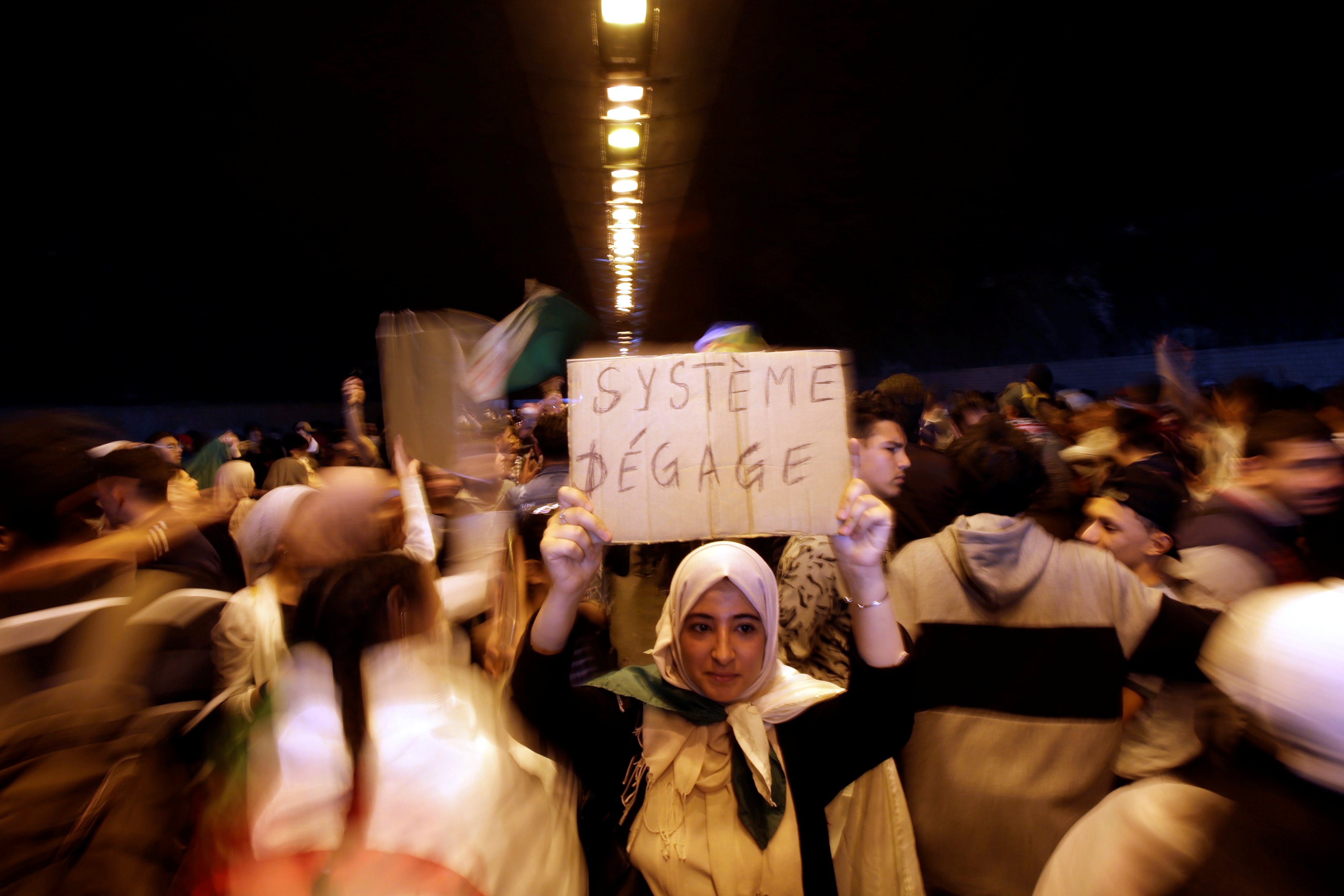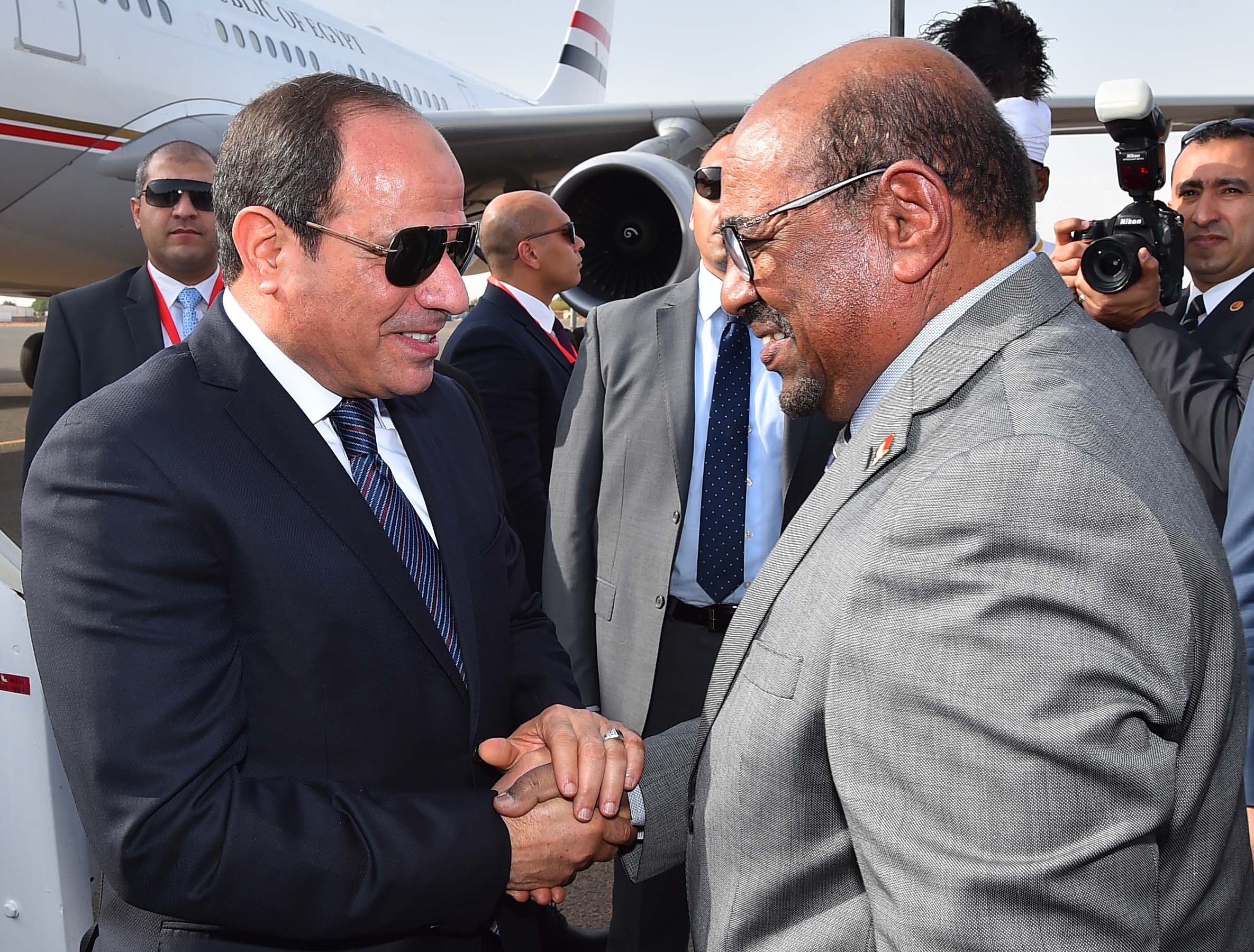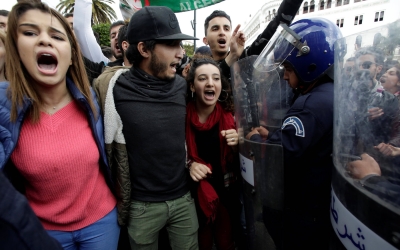By David Hearst
Link

People take part in a protest demanding immediate political change in Algiers, Algeria 12 March, 2019 (Reuters)
We have all been here before, several times.
We were here when Islamists won the first round of elections in Algeria in December 1991; when an uprising in Yemen started on 27 January, 2011; when Hosni Mubarak stepped down after 18 days of demonstrations in Egypt on 11 February; when the protests in the town of Daraa began in Syria a month later and when Libyan President Muammar Gaddafi was cornered and killed in Libya in October that year.
Flames of revolt
The cries and hopes of those days still ring like tinnitus in our ears. And we all remember the savagery that was used to silence them - gas attacks, barrel bombs, massacres, military coups, mass imprisonment, torture, shelling which turned cities to rubble, and states permanently broken by civil war.
And yet the flame which lit those uprisings is still alive. The embers of that fire glow deep underground. Just occasionally and despite all the odds, those flames of revolt resurface.
Such a thing is happening now in Algeria and Sudan.
Bouteflika is still in power, and will stay so until the next election - whenever that is held. It could be never
After weeks of mass protest against his rule and only a week after vowing he would carry on, the ailing 82-year-old Abdelaziz Bouteflika announced he would not seek a fifth term as president of Algeria.
He sacked his unpopular prime minister, promised a national conference "representing all currents of society" that would oversee the transition, and set a date for a new election. He said a new constitution would be written and put to a referendum.

Bouteflika met his friend Lakhdar Brahimi, the respected former UN envoy to Syria, who may well chair the transitional conference.
Bouteflika’s statement, which contradicted the one issued from his hospital bed on 3 March, was naturally met with widespread scepticism and renewed street protest. "No tricks, Bouteflika", the protesters cried and well they might. Algeria's main Islamist party, the Peace Society Movement (FIS), said Bouteflika’s statementwas an attempt to overturn the demands of the people.
Bouteflika is still in power, and will stay so until the next election - whenever that is held. It could be never.
The army's nefarious role
Sudan’s Omar al-Bashir is battling a similar wave of mass protest, by alternating gestures of appeasement - he stepped down as chairman of the ruling party - with strong doses of just the opposite - a one-year state of emergency, which his parliament approved but cut down to six months.
Why are Sudanese protesting against their government?
+ Show
In each transition, if there is indeed to be one, in Sudan and Algeria, the army or security state will play a key role. In Sudan, there is already competition for who comes next. As Middle East Eye revealed, the Mossad chief Yossi Cohen was involved in one interesting discussion with a potential successor.
And the armies of both countries could indeed play a nefarious role, as it did in Egypt from 2011 to 2013.
The armies of both Algeria and Sudan could indeed play a nefarious role, as it did in Egypt from 2011 to 2013
The Egyptian army at first bowed to the revolution and removed Mubarak. It promised both the Islamist and the liberal sides of Tahrir Square that it was on their side. It even served, at times, as the switchboard between them.
But it never stopped keeping a weather eye on what was happening, or not happening, to Bashar al-Assad in Syria.
Two years on, Assad was still there, with the aid of Iranian and Hezbollah troops. When the Egyptian army got the green light and the money from Saudi Arabia and the UAE, his principal backers, it smashed Egypt’s short-lived experiment with democracy.
This was relatively easy to do. The front man for this operation was army General Abdel Fattah el Sisi, a defence minister handpicked by Egypt's first democratically elected president, Mohamed Morsi, because of his apparent religious piety, and fatally trusted by him until the very last moment before the military coup in July 2013 and Morsi's subsequent arrest.

About a week after the Rabaa massacre in Cairo on 14 August 2013, Assad launched a gas attack on opposition controlled suburbs around Damascas whichkilled between 300 and 1700 people.
The timing of these acts is not co-incidental.
Russia claimed the Ghouta attack was staged but brokered a deal requiring Syria to destroy its stockpiles of chemical weapons. This deal has been broken many times since, but the narrative for the rest of decade was set in stone.
Either us or chaos
Ever since those days, the message on the stick of the counter revolution, whether wielded by Russian bombers, Iranian militias, or by the despots of the Gulf states, is essentially the same: "It's either us or the collapse of the state. Remove us and you will all be heading for Europe in dinghies," they all say, as if in chorus.
What is new and interesting about events in Algeria and Sudan is that the people do not seem to be listening to this rubbish any more. In 2011 the Arab Spring was greeted with relative silence in Algeria.
Algerians had just experienced a decade of bitter civil war and no-one was going to tell them to go through that all again.
A new wave of the Arab Spring?
But this is not the mood today. Why is a new generation of Algerians and Sudanese - or Jordanians for that matter - retaking the streets in the full knowledge of what happened in 1991 or 2011 and what it led to? Are we witnessing a new wave of street-led popular protest?
The answer to that will depend on whether dictators do indeed stand down and whether that process remains peaceful. It has started peacefully and has not disintegrating into sectarian or tribal in-fighting - yet.

What one can say is that Algerians and Sudanese have not lost their faith in the ability of mass protest to drive political change. The people have not grown weary of demanding basic human and political rights. Algeria and Sudan are busting that myth.
Whatever cards Bouteflika has left to play, the momentum is still with the street. And the street is right to make sure that it stays there until real and verifiable political change comes about.
What one can say is that Algerians and Sudanese have not lost their faith in the ability of mass protest to drive political change
It is significant that what sparked both the popular revolt in Sudan and Algeria was not simply the daily misery of trying to live a normal life in those countries - the unemployment, price rises, corruption and untouched wealth and privilege of the elite.
Protest specifically was sparked by moves by both Bashir and Bouteflika to continue ruling indefinitely.
Bashir had been in power 30 years before his moves to change the constitution in December triggered the current crisis. Bouteflika had been in power since 1999 and was seeking a fifth term of office. Little wonder the cry of "enough is enough" was heard once again.
This is also not new. The cry of kifaya or "enough" was used by Egyptian protesters when Mubarak was trying to make his son Gamal heir to the throne.
And it is exactly this mistake that Sisi, who at the age of 64 is a generation younger than Bouteflika or Bashir, is in the process of making by forcing through constitutional change which could see him in power until 2034.
Nervous neighbours
So who is looking nervously at events in Sudan and Algeria? Mohammed bin Salman, the heir to the Saudi throne is one of them. So is Mohammed bin Zayed, the Cardinal Richelieu of the counter revolution who has been hard at work plotting responses in each Arab country.
But the man who looks most worried this week is Sisi himself. He looked nervous on Sunday in a televised address to a military gathering. "All this talk (of protests) comes at a price that people are required to pay," Sisi said.
"How are tourism or factories or trade supposed to get off the ground? Should we eat or should we say that we were busy protesting?"
The embers of revolt have not been extinguished at home, despite having dispatched both of Sisi’s serious fellow presidential candidates, Ahmed Shafiq and Sami Anan, to house arrest and prison respectively.
When Moataz Mattar, the Egyptian TV presenter who works for the Turkey-based opposition Egyptian television network al-Sharq, which is owned by the exiled Egyptian politician Ayman Nour, told Egyptians to write: "Be reassured you are not alone" (#اطمن_انت_مش_لوحدك) on banknotes, a wave of posts appeared on social media of bank notes thus adorned.
Such was the response to Mattar, that the Egyptian Central Bank was forced toban notes with the slogan written on it. That simply does not happen if protest is extinguished in Egypt, as we are all led to believe.
Mattar had been been sentenced to 10 years in absentia in 2015 for "inciting against the government". He has since revealed that two of his brothers and their wives and children have disappeared in Cairo and suggested that the authorities may be responsible for abducting his family members.
These are not the actions of a confident regime, let alone one confident enough to stay in power until 2034.
I have written before that Sisi is a dead man walking. I believe that more than ever. Things can not stay as they are in Egypt. The social and political forces which brought us the Arab Spring are the ones which - in the long run - will triumph.
To fight them is to fight the course of history and to delay the inevitable.



No comments:
Post a Comment